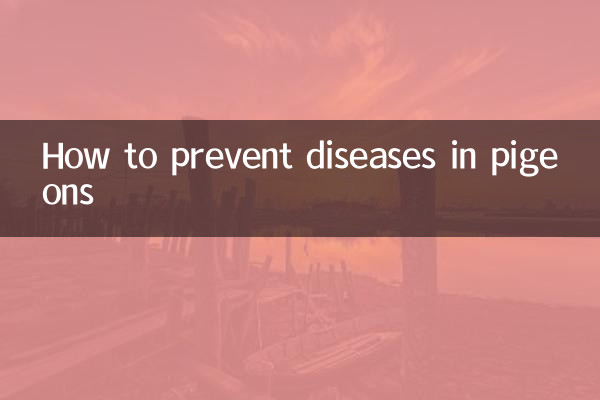How to prevent diseases in pigeons
As a common poultry and pet, the health management of pigeons is particularly important. Preventing diseases not only ensures the quality of life of pigeons, but also avoids economic losses. This article will combine the hot topics and hot content on the Internet in the past 10 days to introduce in detail the prevention methods of pigeon diseases.
1. Common diseases and symptoms of pigeons

Common diseases in pigeons include respiratory infections, digestive system diseases, parasitic infections, etc. The following are pigeon diseases and their symptoms that have been hotly discussed recently:
| Disease name | Main symptoms | High season |
|---|---|---|
| pigeon pox | Acne rash appears on skin or mouth, loss of appetite | summer |
| Salmonella infection | Diarrhea, swollen joints, weight loss | All year round |
| respiratory tract infection | Cough, difficulty breathing, increased nasal secretions | winter |
| parasitic infection | Feather loss, weight loss, anemia | spring and autumn |
2. Preventive measures for pigeon diseases
The key to preventing pigeon diseases lies in scientific management and regular inspections. The following are prevention methods that are hotly discussed across the Internet:
1. Environmental sanitation management
Keeping the loft clean and dry is the basis for disease prevention. In recent hot topics, many pigeon raising experts emphasize the following points:
2. Scientific feeding
A reasonable diet can enhance the immunity of pigeons. Recommended feeding practices in recent discussions include:
| Feed type | Feeding frequency | Things to note |
|---|---|---|
| Grain mixed feed | 2 times a day | Ensure diversity |
| fresh vegetables | 3-4 times a week | Provided after washing |
| health sand | long term supply | Supplement minerals |
3. Vaccination
Vaccination is an effective means of preventing infectious diseases. Recent popular vaccine information is as follows:
| Vaccine name | prevent disease | Vaccination time |
|---|---|---|
| pigeon pox vaccine | pigeon pox | spring |
| Newcastle disease vaccine | Newcastle disease | once a year |
| salmonella vaccine | Salmonella infection | young bird period |
4. Regular physical examination
Recently, pigeon raising forums emphasized that even if pigeons have no obvious symptoms, they should be checked regularly:
3. Special precautions for recent hot discussions
According to the discussion hot spots on the Internet in the past 10 days, the following issues have received special attention:
1. Special care during the change of seasons
Spring and autumn are periods of high incidence of diseases. Recently, many experts have suggested:
2. Isolation of newly introduced pigeons
Recently, many pigeon raising groups have been discussing: newly introduced pigeons must be isolated and observed for at least 2 weeks to avoid introducing pathogens.
3. Prevention of wild pigeons
Recent hot news mentioned that wild pigeons may be a source of disease transmission. It is recommended that:
4. Summary
Preventing pigeon diseases requires comprehensive measures, including good environmental sanitation, scientific feeding and management, timely vaccination and regular health examinations. Recent hot topics discussed across the Internet show that seasonal care, isolation of new pigeons and prevention of contact with wild pigeons are areas that require special attention at the moment. Only by doing comprehensive prevention work can we ensure the healthy growth of pigeons.
Pigeon raising enthusiasts should continue to pay attention to industry trends and the latest research results, adjust their breeding plans in a timely manner, and create the best living environment for pigeons.

check the details

check the details